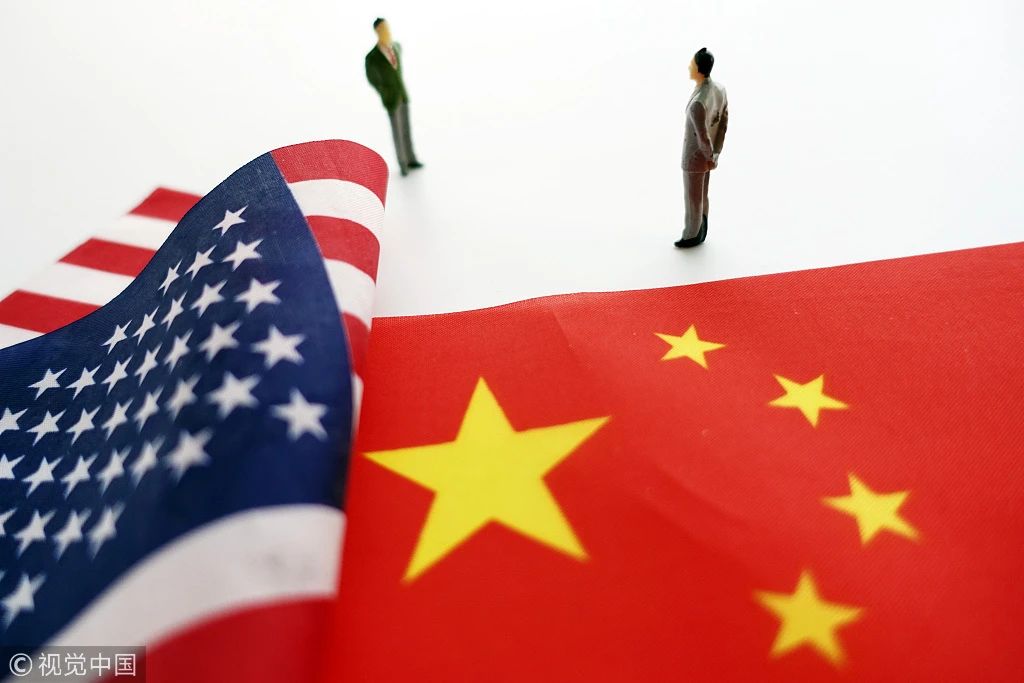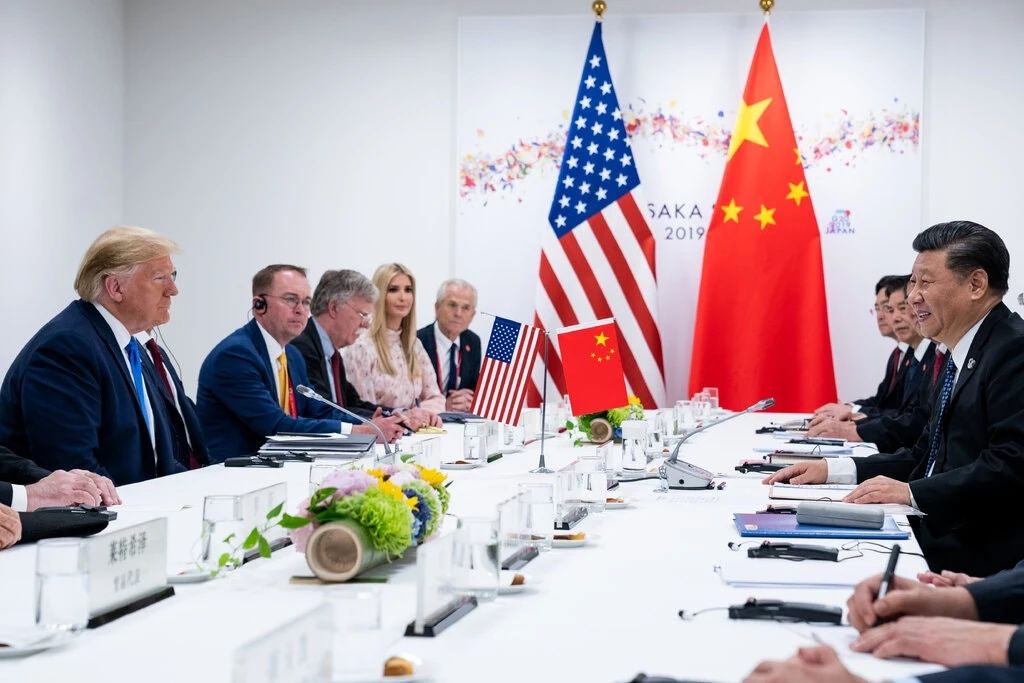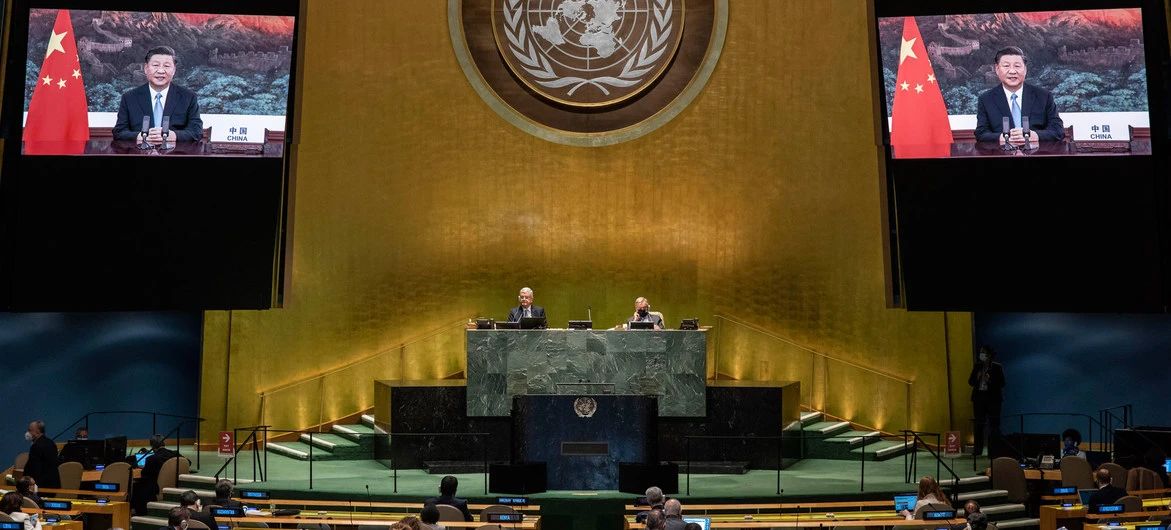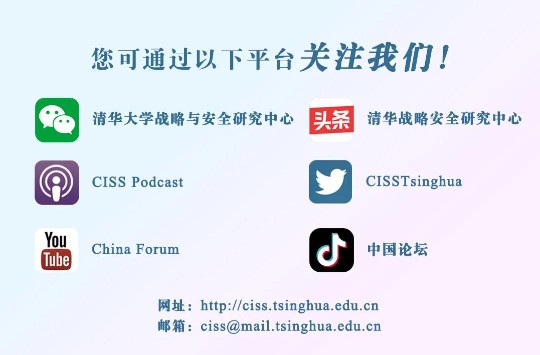近来,中美关系日趋紧张,有关两国是否会“脱钩”并开启新冷战的话题在全球引发热议。有些西方媒体公开作出了两国已经进入“新冷战”的论断。但也有一些人士和媒体文章对此提出质疑和不同观点。中国论坛将相关反驳观点摘录、综合如下,供读者参考。
一、如发生中美“新冷战”,对西方国家及世界秩序都十分不利。
1、中美“新冷战”将会导致技术鸿沟的不断加深。
The worst-case scenario, as described by Mr. Seaman, is of a growing technological divide. If international collaboration on standards grinds to a halt, it could create opposing technology blocs that do not talk to each other. “Think of it almost like trying to connect with someone on [Tencent’s] WeChat by using Facebook, but on an industrial scale.
(Oct 7, 2020, Financial Times, From AI to facial recognition: how China is setting the rules in new tech)

△图片来源:Photo/VCG
2、“新冷战”一旦发生,世界范围内所有国家都将付出不可承受的代价,我们必须尽力避免这种情况的发生。
"We are moving in a very dangerous direction," Mr Guterres said. "Our world cannot afford a future where the two largest economies split the globe in a Great Fracture - each with its own trade and financial rules and internet and artificial intelligence capacities. A technological and economic divide risks inevitably turning into a geostrategic and military divide. We must avoid this at all costs."
(Sept 22, 2020, BBC, Is the world entering a new Cold War?)
3、对于德国等西方国家来说,与中国交恶将极大影响国家经济利益,这不是符合人民期望的做法。
For countries such as Germany this is not about a play on words. China bought €96bn (£87bn) of German exports in 2019 – nearly half as much as the EU’s. Volkswagen sold 4.2m cars there in 2017 financial year. If Deutsche Telekom was forced to remove Chinese equipment suppliers from its network – a scenario called Armageddon – it would take 5 years and cost billions. A systematic rivalry is not in Berlin’s interests, or indeed what its people want. In survey after survey they affirm Trump is a greater threat to world peace than Xi.
(Jun 22, 2020, The Guardian, US v China: is this the start of a new cold war?)
4、在全球气候变化、新冠疫情、区域性种族主义等风险与挑战之下,唯有最大限度的国际合作才是唯一的出路。
CND chairwoman Kate Hudson said that any heightened tensions towards China posed a massive risk to the human race, calling for “maximum global co-operation” to tackle the challenges of the climate emergency, the coronavirus, as well as endemic racism.“As a movement we face huge challenges and huge responsibilities. If conflict comes between two nuclear-armed states, the future of the world will be put in doubt,” she said.
(Oct 4, 2020, Morning Star, West’s new Cold War tensions ‘put the globe at risk’)

△图片来源:Erin Schaff/The New York Times
二、目前中美关系的情况与美苏“冷战”迥然不同,“新冷战”仅是一种不甚准确的简单类比。
1、若发生中美“新冷战”,其复杂程度将远超美苏冷战。
“There is an existential competition between two countries with fundamentally different visions,” says Mike Gallagher, a Wisconsin Republican lawmaker and China hawk. “This is more complicated than the old cold war.”
(Oct 8, 2020, Financial Times, ‘This is a guy who is a thug’: how US elite became hawks on Xi’s China)
2、与美苏当年不同的是,中美两国在经济、社会、科学、教育等各个方面都联系紧密。
But while the parallels between the current US-China rivalry and the start of the cold war are striking, there are also some important differences. The most obvious is that the economies of the US and China are deeply integrated with each other. Trade between China and the US amounts to more than half a trillion dollars a year. China owns more than $1tn of US debt. Important American companies rely on making and selling their products in China. Manufacture of the Apple iPhone is built around a supply chain based in southern China. This economic intertwining has also created a degree of social convergence. “Chinese society is more similar to American society than Soviet society ever was,” Yale University historian Odd Arne Westad noted in Foreign Affairs magazine. There are also strong scientific and educational ties between China and the US.
(Oct 5, 2020, Financial Times, A new cold war: Trump, Xi and the escalating US-China confrontation)
3、中国与前苏联相比最大的不同是中国的经济更有活力,更具可持续性,因此中国的政治制度可能更有韧性。
1. It’s a competition over ideas and political and economic systems, although the differences between China and the United States are somewhat less than the differences between China and the Soviet Union. But the big differences between then and now are, first of all, that China and the United States have been, up until now, much more interdependent than the United States and the Soviet Union or between the United States and China before normalization.
But I think the biggest difference is that the Chinese economy seems, at this point, to be much more vibrant, much more sustainable than the Soviet economy, and therefore the Chinese political system is likely to be much more resilient than the Soviet Union’s was.
(Oct 12, 2020, US-China Perception Monitor, Harry Harding on Taiwan, Cold War 2.0, and US-China Relations)
2. Loong [Lee Hsien Loong] also urges the US not to see this as a rerun of 1946. “China is far from a Potemkin village or the tottering command economy that defined the Soviet Union in its final years. Any confrontation between the great powers is unlikely to end, as the cold war did, in one country’s peaceful collapse.”
(Jun 22, 2020, The Guardian, US v China: is this the start of a new cold war?)
三、中方从来没有发起“新冷战”的动机,也不愿见到这种局面的出现。
1、中国无意成为另一个美国。中国不输出意识形态,也从不干涉别国内政。
1. In an interview with state media Xinhua News Agency on Wednesday, Chinese State Councilor and Foreign Minister Wang Yi said “today’s China is not the former Soviet Union.” He added that his country has “no intention of becoming another United States.”“We have no intention of becoming another United States. China does not export ideology, and never interferes in other countries’ internal affairs,” he said.
(Aug 5, 2020, CNBC, China says it has no intention of ‘becoming another United States’)
2. From Beijing’s perspective, it is the United States that has plunged relations to what China’s foreign minister, Wang Yi, said last week was their lowest point since the countries re-established diplomatic relations in 1979.“The current China policy of the United States is based on ill-informed strategic miscalculation and is fraught with emotions and whims and McCarthyist bigotry,” Mr. Wang said, evoking the Cold War himself to describe the current level of tensions.
(Jul 14, 2020, The New York Times, Caught in ‘Ideological Spiral,’ U.S. and China Drift Toward Cold War)

△图片来源:联合国图片/Eskinder Debebe
2、中国无意与任何国家打“冷战”或“热战”,希望能继续缩小分歧,通过对话和谈判协商解决问题。
Chinese President Xi Jinping told the United Nations General Assembly on Tuesday that Beijing has “no intention to fight either a Cold War or a hot one with any country,” as tensions grow between China and the United States. “We will continue to narrow differences and resolve disputes with others through dialogue and negotiation. We will not seek to develop only ourselves or engage in zero sum game,” Xi said in a pre-recorded video statement to the annual gathering of world leaders, conducted virtually this year due to the coronavirus pandemic.
(Sept 22, 2020, Reuters, At U.N., China's Xi says no intention to fight 'a Cold War or hot one' with any country)
四、美方试图发动“新冷战”,这一举动是自私、轻率的。
1、美国无理要求日韩等国与中国脱钩,但对它们来说,这无异于“经济自杀”。
According to Kishore Mahbubani, a fellow at the Asia Research Institute, Trump has prepared for this battle chaotically. “The fundamental problem is that the US has decided to launch a geopolitical contest against China, the world’s oldest civilisation, without first working out a comprehensive strategy on how it is going to manage this contest. It is quite shocking. These are not abstract issues for Korea and Japan. America wants them both to decouple from China, but for them that is economic suicide.”
(Jun 22, 2020, The Guardian, US v China: is this the start of a new cold war?)
2、美国在无端发起与中国的“新冷战”时,并未考虑将如何合理地结束这一冲突。
The U.S. government has decided it is time to confront the People’s Republic of China, leading to what some have called “a new cold war” or the more benign and official “great-power competition.” But as many have pointed out, the United States currently lacks a coherent strategy about how to confront China. Busy giving speeches and exploring new ways to hit China, U.S. officials are making the case that this confrontation is necessary to preserve freedom and democracy and that the United States must fight to win. But nobody in Washington seems to have asked the most important question: How does this end?
(Sept 24, 2020, Foreign Policy, The U.S. Needs An Endgame Before It Plunges Into the Next Cold War)e are strong
3、与中国的对抗是为了掩饰美国内两党纷争并维护美国的全球主导地位。
Anti-China sentiment unites an otherwise divided and partisan Washington. …For U.S. President Donald Trump, the contest with China is about redressing perceived inequities by leveling the trade and tech playing fields and consolidating the U.S. position as the paramount global power.
(Jul 08, 2020, The Diplomat, The US-China Cold War Has Already Started)
4、特朗普把对华敌意伪装成“新冷战”战略,且正在使得局面走向两败俱伤。
Trump and his minions rant about a new Cold War, but they are woefully ignorant of how the United States succeeded in the old Cold War and how China differs from the Soviet Union. They have drifted toward a lose-lose strategy: The United States and China can hurt each other — but to what end? Trump masquerades hostility as strategy.
(Oct 8, 2020, The Washington Post, Trump is losing his new ‘Cold War’ with China)

